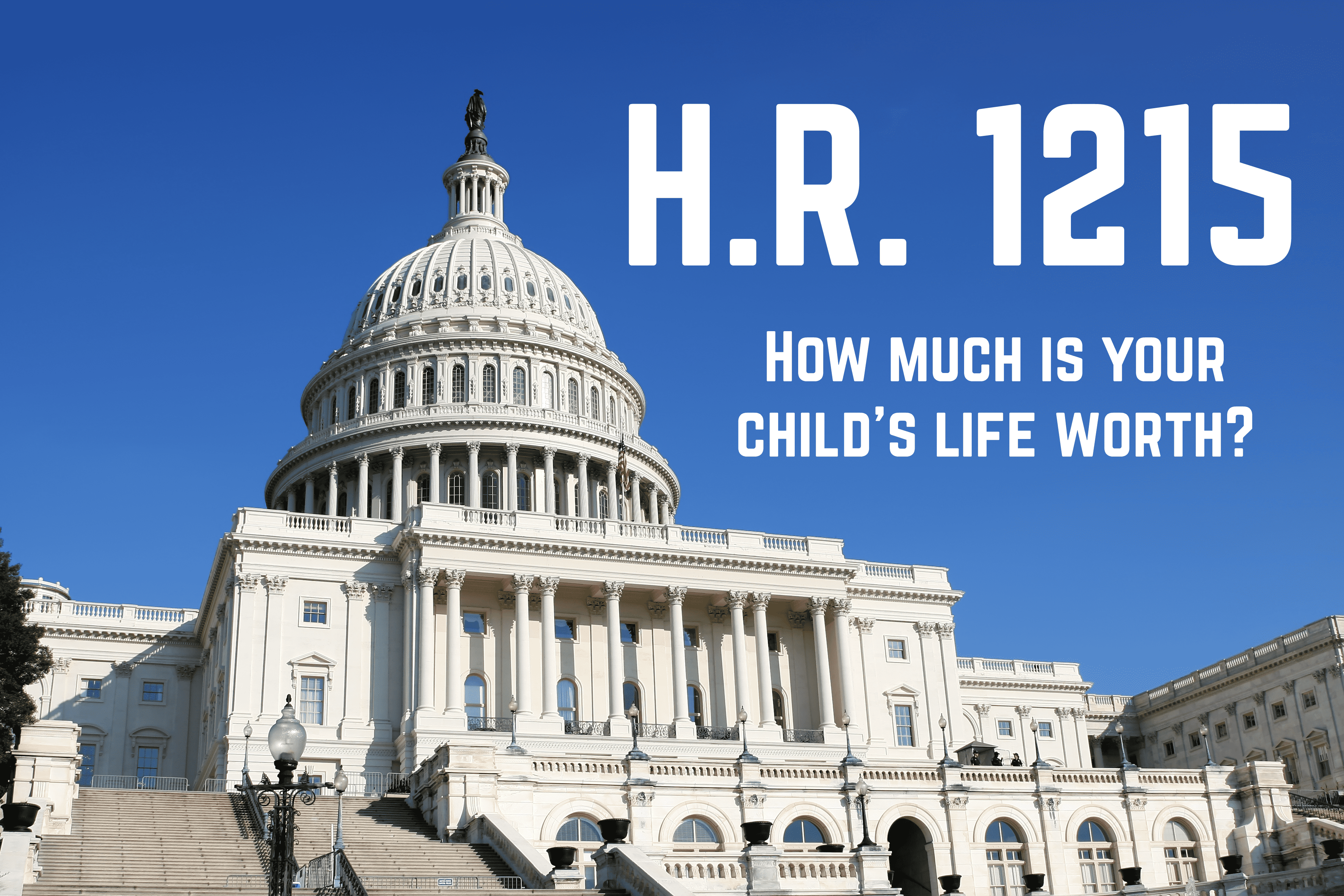H.R. 1215
Protecting Access to Corporations Providing Unsafe Care Act of 2017
Does $250,000 sound like enough compensation for the loss of your spouse, mother, or child? Does it sound like enough compensation if your grandmother was abused in a nursing home? We didn’t think so.
On February 28, 2017, the U.S. House Judiciary Committee passed HR 1215 as part of the recent administration’s budget proposal. This bill is designed to limit the amount of compensation that families can sue for in a medical malpractice case when their loved one has been killed or severely damaged by a hospital, healthcare facility, or nursing home.
The bill claims to save healthcare costs by capping non-economic damages at $250,000, since medical providers apparently perform “defensive procedures” to prevent possible malpractice repercussions, driving up costs.
However, this bill really helps the large insurance companies and healthcare corporations who want to limit their accountability when their actions cost a family their child, mother, or sibling. After all, if this bill was passed into law and a cap was placed on the non-economic damages, the pain of losing your wife or child could never exceed $250,000. This clearly benefits one group: those who are responsible for the malpractice.
How does HR 1215 work?
If a family member is harmed by unsafe hospital practices or nursing home conditions, of if they are injured by a defective drug or medical device, sexually abused by a doctor, or given the wrong dose of a fatal medication, H.R. 1215 would limit the amount of money that the family could sue for. Those who are proponents of this bill, say it will save people on healthcare costs by lowering costs for healthcare providers and by limiting unnecessary treatments. But in the real world, healthcare costs don’t go down; profits go up. This bill is simply a way for lobbyists and career politicians to make more money for the big corporations they work for. And that is exactly what will happen.
H.R. 1215, cleverly disguised as the“Protecting Access to Care Act of 2017”, limits how much compensation a patient can receive no matter how gross the negligence, malpractice, or intentional harm of a doctor, hospital, or nursing home. And although the Republican congresspeople who put this bill together say it seeks to limit big government, it would actually put the federal government in charge of the decisions that states and local juries were once in charge of. Quite frankly, it takes away the rights of ordinary citizens to decide how gross the misconduct and places it in the hands of the those who benefits from lower award amounts.
What does a $250,000 cap really mean?
The $250,000 cap refers to non-economic damages in a medical malpractice case. Non-economic damages are damages that are not obviously quantifiable. Economic damages are things like medical bills or lost wages. Non-economic damages include pain and suffering, which compensates victims for things like paralysis, physical and sexual trauma, the inability to reproduce, or the wrongful death of a loved one. This cap means that there are no exceptions to the compensation limit. No matter what happens, whether an elderly person is abused in a nursing home, a child is left severely brain injured from a defective medication, or if a parent is killed during a botched surgery, the compensation amount can never go higher than $250 thousand dollars.

What else does HR 1215 say?
H.R. 1215 also:
- Places a federally-mandated statute of limitations at three years.
- Allows the negligent or ill-intended wrongdoer to reduce their obligation by the amount of additional compensation a victim receives from disability payments, workers’ compensation, or other insurance payments.
- Requires the injured patient to cover the cost of their injury or loss if one of the fully-responsible wrongdoers cannot afford to pay.
- Places a federally-mandated prohibition against victims receiving their full compensation amount in a lump sum so that insurance companies can make small payments and benefit from the interest accrued.
- Restricts an individual’s right to work out attorney fees with their lawyer while the insurance companies or healthcare providers can hire any attorney they want at any cost.
- Bans hospitals, nursing homes, or healthcare providers from being included in lawsuits against drug companies over an unsafe or defective drug, even if the healthcare provider negligently prescribed or dosed the drug and is partly responsible for the damages, including injury or death.

Is medical practice really an issue?
John Hopkins University researchers analyzed mortality data from eight years and concluded that medical errors are the third-leading cause of death after heart disease and cancer. If doctors and hospitals are no longer held to a high level of accountability for their negligence, this position could easily rise as doctors will be less accountable for careless or negligent mistakes.
Recently, the Huffington Post wrote an article in which they detail two cases of doctor who work in a state (Texas) that has already mandated similar laws to HR 1215. In this article, they highlight Texas neurosurgeon Christopher Duntsch, who maimed, paralyzed, and killed patients but continued practicing. Laws that cap non-economic damages in these states allowed for this rich neurosurgeon to keep practicing, since there was no way to stop him financially.
The article also spoke of Dr. Stefan Konasiewicz who, after being fined in Minnesota, moved to Texas where he could operate unsafely on patients with only minor repercussions allowed by law.
What’s more is that this HuffPost article cites a research studies that shows that patient safety in states with compensation caps, like Texas, produce “consistent evidence that patient safety generally falls” when these caps are in place. The reason for this? Medical malpractice liability laws provide incentive for healthcare providers to be careful and concerned about the repercussions of their actions.
If this bill is made into law, the very thing that keeps nursing homes and hospitals from negligently hiring and employing dangerous staff would be gone. If a huge nursing home corporation fails to vet their employees, and they abuse a patient, the economic expense to their corporation would be minimal; they would be free to continue operating as they please with little economic consequences.
Dolman Law Group Accident Injury Lawyers, PA
Dolman Law Group Accident Injury Lawyers, PA does not stand for this sort of lax lawmaking that protects big corporations and leaves devastated families to fend for themselves. If you feel strongly about this issue, contact your local representative and tell them that H.R. 1215 is not okay. Visit whoismyrepresentative.com to find the office you should email. Tell your representative to vote NO on HR 1215.
If you or a loved one has been injured by a negligent healthcare provider, contact our firm. We will fight to get you the justice your deserve. Call us at 727-451-6900.






